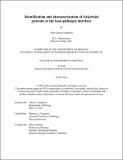Identification and characterization of rickettsial proteins at the host-pathogen interface
Author(s)
Sanderlin, Allen Garrett
DownloadThesis PDF (29.70Mb)
Advisor
Lamason, Rebecca L.
Terms of use
Metadata
Show full item recordAbstract
Bacterial pathogens subvert host cell processes during infection by secreting protein effectors that manipulate host machinery. Cataloging such effectors has enabled a deeper exploration of the molecular basis of disease for numerous pathogens. Members of the Rickettsia genus are obligate intracellular bacteria that pose a growing threat to human health, but their complete dependence on the host cell niche has precluded a thorough investigation of the bacterial factors acting at the host-pathogen interface. Accurately identifying and characterizing these proteins will provide a necessary framework for understanding rickettsial biology and disease.
In this work, I demonstrate that the conserved rickettsial protein RARP-1 is not a bona fide secreted effector, as had been previously suggested. Instead, I found that Rickettsia parkeri RARP-1 localizes to the periplasm where it supports the rickettsial life cycle by promoting host cell invasion and intracellular growth. Motivated by this discrepancy, I developed a cell-selective proteomic screen to identify effectors secreted during R. parkeri infection. In addition to several known secreted effectors, my approach revealed the novel secreted rickettsial factors SrfA–G. Notably, these Srfs include Rickettsia-specific proteins of unknown function that are structurally diverse, variably conserved, and targeted to distinct host cell compartments. I further demonstrate that one of these effectors, SrfD, localizes to the endoplasmic reticulum where it interacts with the host Sec61 translocon. Taken together, this work highlights the elusive nature of rickettsial effectors while offering new ways to probe the unique biology of these bacterial pathogens.
Date issued
2024-05Department
Massachusetts Institute of Technology. Department of BiologyPublisher
Massachusetts Institute of Technology